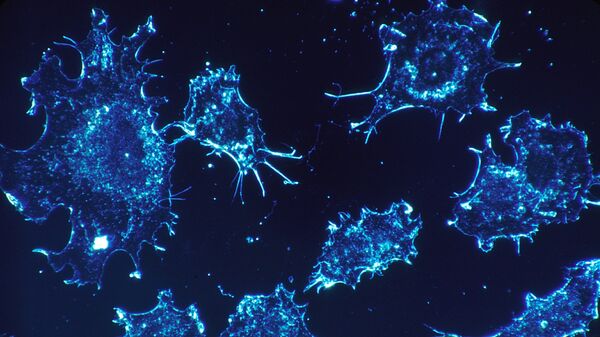Professor Hardev Pandha from the University of Surrey who led the research delved deeper into the results of the study and its significance.
Sputnik: A strain of the common cold virus can infect and kill bladder cancer cells according to new research provided by the University of Surrey. Hardev, you were the study leader in this research, can you tell us a little more about the study you and your team embarked on and the significance of these findings?
Hardev Pandha: The virus in question has been characterised and known to have cancer-killing properties for some time. So obviously, the current clinical trial results on the back of approximately 10 years of research. We know a number of viruses that occur in nature, or can be engineered, are able to kill cancer cells very effectively while sparing normal cells. So this is a virus that was identified by an Australian group a number of years ago, which actually is in clinical trial, both as a treatment where you inject the virus directly into skin tumours, melanoma, and also, we've been involved in a study where we give the same virus intravenously for systemic treatment for patients with advanced cancers. So this is effectively the third approach. This was a local treatment inside the bladder through a catheter, trying to maximally expose bladder cancers that are present of the lining of the bladder, to high doses of the virus. We gave the virus after the patients were diagnosed, and but before they were treated by surgery, so in other words, the virus had a chance to do something to the tumour, and we would have access to the tumour after the surgeon respected the tumour to see the effects of the virus. In one patient, as you know from the report, the tumour disappeared completely. Now we know that patient definitely had cancer because we saw it on a sister's copy examination and also these patients shed cancer cells into the urine which we can detect. So that patient definitely had cancer before and had no evidence of cancer afterwards.
Sputnik: Despite this study being in its early stages, it safe to say you and your team are already seeing some positive results. How does it compare to other than existing cancer treatments?
Hardev Pandha: So-called superficial or non-muscle invasive bladder cancer is currently treated by surgery removal and then for patients who are at high risk of it coming back and we know that from examining the tumour that's taken out, patients get BCG treatment which is a live bacterium. In some respects, patients already treated to the biological treatments such as like as a live bacterium, and we have a live virus. In terms of the actual approach, or putting a catheter in the patient and infusing the biological agent that's been fairly standard of care around the world. The issue with the BCG bacterium is that it's actually quite toxic, and about 30 patients can't complete the course. That's because it's lack of specificity, it sticks to everything around the bladder, causes inflammation of the bladder and if you will, the patient effectively gets a very nasty urinary tract infection. So the complications are pain and bleeding and just as dental discomfort. The other thing is BCG, although it reduces the risk of recurrence, it doesn't eliminate the risks. So that's still a significant number of patients go from a very superficial disease to an invasive disease that then spreads around the rest of the body. So the current standard of care is good but it is toxic and there is room for inequality and significant improvement. What we do know is that traditional old-fashioned chemotherapies that don't really work in this context - many have been tried. So I think the advance with our treatment is, firstly, that it's a virus not a bacterium. Secondly, it is highly selective for cancer. The final comment is that what the virus does, it activates the immune system and the lining of the bladder around where the cancer is. So it's giving these major alert signals to the rest of the body.
Sputnik: What are the next steps for this study, and your team, going forwards?
Hardev Pandha: Unfortunately the company that developed the virus were bought by Merck, the American pharmaceutical company, so it's slightly less easy to know what Merck strategic sort of next step is. I am told that they are very obviously that requires a virus to progress it in the sense of multiple trials and the combination with checkpoint inhibitor is very much in that perspective and that's something that we hope will get going very soon.
The views and opinions expressed by Hardev Pandha are those of the expert and do not necessarily reflect those of Sputnik.



